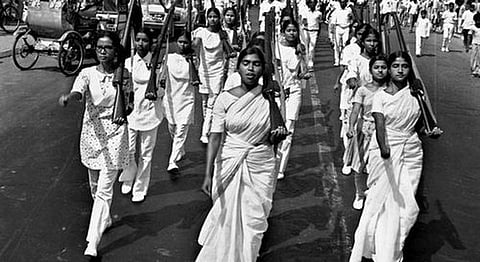
- HOMEGROWN WORLD
- #HGCREATORS
- #HGEXPLORE
- #HGVOICES
- #HGSHOP
- CAREERS
- ABOUT US
- CONTACT US

A country, ironically given the stature of a powerful symbol of womanhood, is, even today, bound by traditions where women have been subjected to ideas of regressiveness. It is due to this idea that whenever women have broken the threshold of society barriers, they have been deemed with labels. But certain radical thinkers have been striving hard to change this jaded opinion through their carefully expressed voice and their work, that aims to rid of the unfair disparity that society carries on.
Over the years, feminism in India was constantly rallied for by writers. Rabindranath Tagore’s Charulata, for instance, which was later adapted to the screen by Satyajit Ray, was a heroine of strong emotion and assertion. Disturbed by the apathy from her negligent husband, Charulata did not hesitate in seeking out the love of a relative. Ismat Chugtai, one of the country’s most prominent thinkers and writers was charged for obscenity by the British Government for her short story Lihaaf, which spoke of a lesbian relationship, championed this very idea of feminism, and was later acquitted by court. Contemporary writers like Arundhati Roy have unabashedly expressed inconsistencies in their personal lives, drawn upon them to create works of literature, and idealised the idea of pro-choice.
Vina Mazumdar
When trying to understand the birth of feminism in India, Vina Mazumdar is the honorary leader of the crew. An academic, she introduced feminism to a politically and socially struggling country in as early as the 70s. Through her project, ‘University Education and Social Change in India’ and the report she drafted as the secretary of the first Committee on the Status of Women in India, Towards Equality, she firmly established the need for a change in society outlook. Greatly involved in building the Centre for Women’s Development Studies (CWDS), she walked arm in arm with another child of Indian Feminism, Lotika Srikar. The first lady faculty for Law at Delhi University, Lotika Srikar was a founding member of CWDS and she, along with Vina Mazumdar raised pertinent cries against the atrocities committed against women and the need to induce equality in all spheres of life, while juggling successful married lives, strong careers that were unheard of for women back then. Together, they were the pioneers of Indian Feminism.
Author and noted feminist Rita Banerjee also presented an interesting take to the subject through her article, ‘Why Kali Won’t Rage’. Since India has such deep rooted reverence to our heritage, why wasn’t Kali the symbol of fighting regressive attitude, as she was the goddess who rose against unfairness and repression. Banerjee argued that not education, but a revolution was required for women to regain complete control over their individuality and sexuality. Veteran Oriya literature author Sarojini Sahoo also stated that repression of sexuality, patriarchy and social norms like dowry and arranged marriage tend to add on to the already existing disparity. She argues about how, even today, in spite of the financial independence that women have undergone, they must still come back home and take control of the kitchen. Feminist and author, Urvashi Butalia even launched a publishing house, Kali for Women that produced works that spoke of prominent political and social change.
While contemporary writers have been continually producing work that is unabashedly rebellious in its themes, the society itself is going through a strange transgression. While on one hand, women are superficially encouraged to take up education and work, any step beyond conventional thresholds has led to anything from a violent assault to misogynist comments. Much recently, the man behind the Mangalore pub attacks, Pramod Muthalik has been welcomed by the BJP, whereas his aid has joined Congress. With national parties seeking to overlook issues against gender parity, it has been left to a few handful people to take up the cause loud and clear.
Irom Sharmila has been relentlessly fighting for the cause of removal of the Armed Forces Special Protection Act, or AFSPA, which allows armed forces to deal roughly with any tension in high alert areas without any warrant, or subsequent tracking of the behaviour. This has led to many members of the army raping women of the north east, incidents constantly ignored by the government’s refusal to remove AFSPA even as Sharmila’s fast of 14 years rages on. Indian scientist and environmental activist Vandana Shiva has insisted that nature and women, alike, have been oppressed for centuries, and has therefore stressed on the need to restore respectability to both.
The concept of feminism has often been wrongly accused, at least in India, of attempting to create a modern corrupt woman out of a traditional figure. In reality, feminism simply battles to place a woman on the same level as a man, giving her the right to choice and expression, thus reaffirming equality in society. Morality is a skewed concept, and morally judging the actions of an entire gender because of the gender, even worse. A revolutionary change in ideas is urgently needed, and while that could happen, it helps to have a few profound thinkers slowly bringing about change in ideas.
